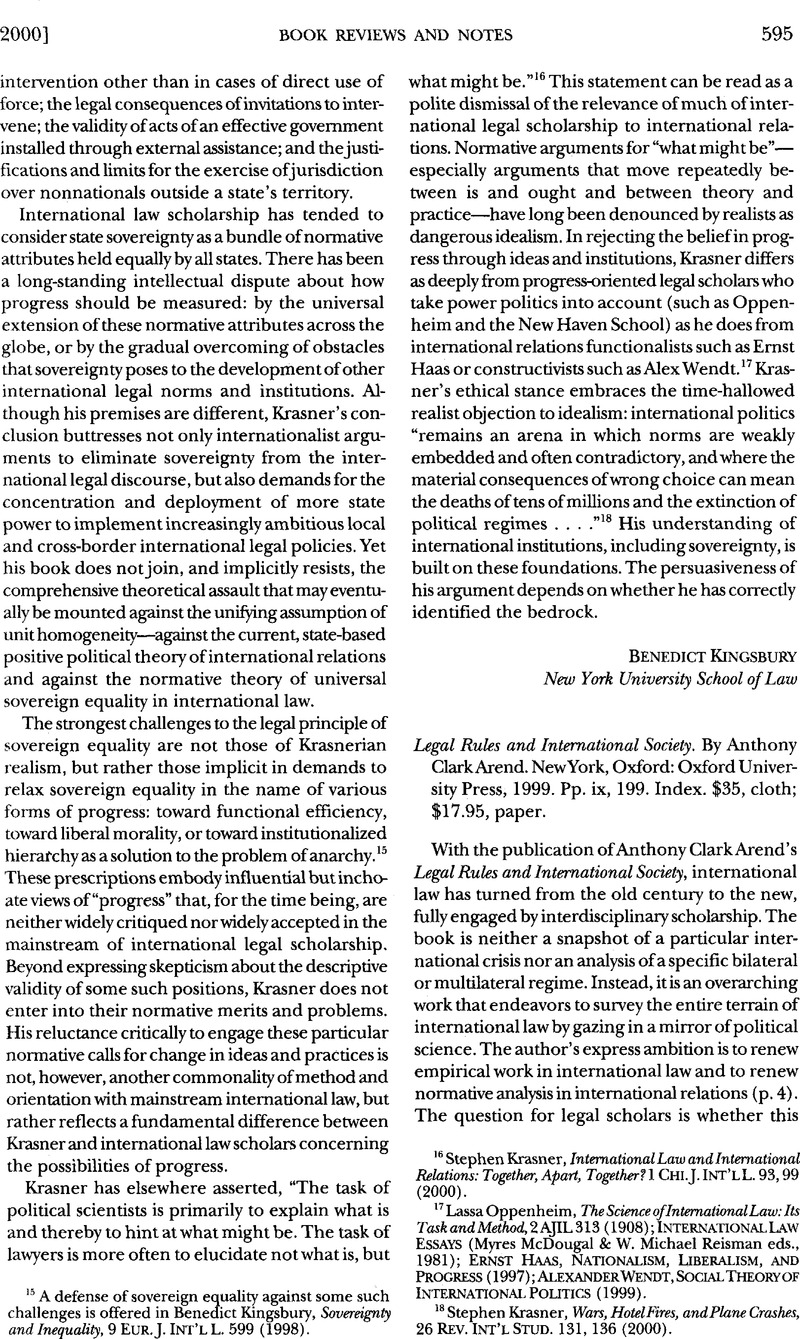No CrossRef data available.
Article contents
Legal Rules and International Society. By Anthony Clark Arend. New York, Oxford: Oxford University Press, 1999. Pp. ix, 199. Index. $35, cloth; $17.95, paper.
Published online by Cambridge University Press: 27 February 2017
Abstract

- Type
- Book Reviews and Notes
- Information
- Copyright
- Copyright © American Society of International Law 2000
References
1 Jorge, Luis Borges, Pierre Menard: Author of the Quixote, in Borges, A Reader: A Selection From The Writings of Jorge Luis Borges 96 (Emir, Rodriguez Monegal & Reideds, Alastair., 1981)Google Scholar [hereinafter Borges, A Reader].
2 Id. at 100.
3 See Gene H., Bell-Villada, Borges and His Fiction 126 (1981)Google Scholar (describing the “Pierre Menard effect” in popular art). “Sampling” is a technique in contemporary music wherein one original composition is digitized and inserted into the body of another. See Jarvis v. A&M Records, 827 F.Supp 282, 289 (D.N.J. 1993) (“The digital code that describes the sampled music . . . can then be reused, manipulated or combined with other digitalized or recorded sounds…..”). It is especially common in the “multi-faceted form of art” known as hip-hop. Sunenblick v. Harrell, 895 F.Supp. 616 (S.D.N.Y. 1995) (describing hip-hop as deriving its substance from rap music, breakdancing, and graffiti).
4 Arend positions his work as part of a new wave of political science scholarship that takes the law very much into account, citing Anne-Marie, Slaughter, Tulumello, Andrew S., & Wood, Stepan, International Law and International Relations Theory: A New Generation of Interdisciplinary Scholarship, 92 AJIL 367 (1998)Google Scholar.
5 Borges, supra note 1, at 97.
6 See Barth, John, The Literature of Exhaustion, Atlantic, Aug. 1967, at 29 Google Scholar, reprinted in Critical Essays on Jorge Luis Borges 87 (Jaime Alazraki ed., 1987) (“If Beethoven’s Sixth were composed today, it would be an embarrassment; but clearly it wouldn’t be, necessarily, if done with ironic intent by a composer quite aware of where we’ve been and where we are.”).
7 Borges, supra note 1, at 99.
8 See Miguel de, Cervantes, The Adventures of Don Quixote 343 (Cohen, J. M. trans., Penguin Books 1950) (pt. I, 1605; pt. II, 1615)Google Scholar.
9 Borges, supra note 1, at 101.
10 The debate over Article 2(4) was well presented in two articles that appeared in this Journal: Franck, Thomas M., Who Killed Article 2(4)? or: Changing Norms Governing the Use of Force by States, 64 AJIL 809 (1970)CrossRefGoogle Scholar; Henkin, Louis, The Reports of the Death of Article 2(4) Are Greatly Exaggerated, 65 AJIL 544 (1971)CrossRefGoogle Scholar.
11 Borges, supra note 1, at 101.
12 Id. at 102.
13 Id.
14 Paul de, Man, A Modem Master, N.Y. Rev. Books, Nov. 5, 1964 Google Scholar, reprinted in Jorge Luis Borges 21, 25 (Harold Bloomed., 1986).
15 Arend (pp. 80–86) draws primarily on the notions of authority and control as expressed in McDougal, Myres, Some Basic Theoretical Concepts About International Law: A Policy Oriented Framework, in 2 The Strategy of World Order 129 (Falk, Richard A. & Mendlovitz, Saul H. eds., 1966)Google Scholar.
16 Arend (pp. 120–22, 130–31) draws primarily on the concept of a regime as a set of mutual expectations, organizational energies, and commitments accepted by members of the regime, as expressed in Ruggie, John G., International Response to Technology: Concepts and Trends, 29 Int’l Org. 570 (1975)Google Scholar.
17 Arend (pp. 130–31) draws on John Rawls’s notion of “rules of a practice” as constitutive rules for a system, as found in his Two Concepts of Rules, 64 Phil. Rev. 3, 24 (1955), and as elaborated upon further and applied to the international system in Keohane, Robert O., International Institutions and State Power: Essays In International Relations Theory 184 (1989)Google Scholar.
18 Bell-Villada, supra note 3, at 125.
19 In a manner suggesting a Borgesian mirror reflecting in other mirrors, this statement is quoted in English in Bell-Villada, id., but is taken from Borges’s interview over French radio as quoted in Georges Charbonnier, El Escrltorysu Obra 75 (1967), which is itself a Spanish translation of Georges Charbonnier, Entretiensavec Borges (1967).
20 Jorges, Luis Borges, The Total Library, in Borges, A Reader, supra note 1, at 94, 95 Google Scholar (making reference to Lewis Carroll (pseud.), Sylvie and Bruno (1893)).
21 Barth, John, The Literature of Exhaustion, in Critical Essays on Jorge Luis Borges, supra note 6, at 90 Google Scholar (attributing the quotation to one of Borges’s unnamed editors). The phrase “literature of exhaustion” was coined by Barth and applies to modes of expression as diverse as so-called intermedia arts (“Somebody-or-other’s unbound, unpaginated, randomly assembled novel-in-a-box... [or] Cage’s 4’33” performed in an empty hall,” id. at 83), as well as to the writings of Jorge Luis Borges.
22 Jorges, Luis Borges, Kafka and His Precursors, in Borges, A Reader, supra note 1, at 242, 243 Google Scholar.




